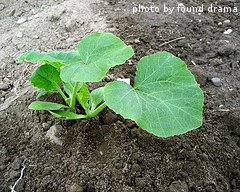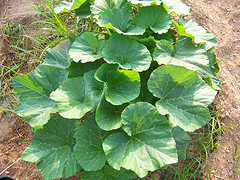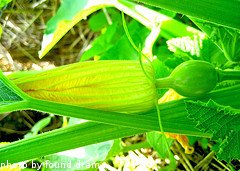Watering and Fertilizing Acorn Squash
Fertilizing Acorn Squash Plants
You can fertilize your acorn squash shortly after planting, when the seedlings first emerge. Another dose of fertilizer can be applied after the blossoms appear. The first dose will give the plants the boost they need to get large enough to produce several squash. The second dose will aid in fruit production.

Acorn squash plants are heavy feeders and it's best to use a balanced fertilizer. If you want to use a granule type fertilizer, choose one such as 10-10-10 or 12-12-12. These numbers indicate the percentage of nitrogen, potassium and phosphate in the fertilizer mixture. Equal percentages will ensure consistent plant growth as well as good fruit production. Simply scatter the granules on the ground around the plant. When fertilizing acorn squash plants with granules, avoid touching the plant with the granules as it may cause the plant to burn. Apply according to the manufacturer's directions - usually 1 1/2 pounds per 100 square feet. After scattering the granules, water them in well.
If you would rather use a water soluble fertilizer, that's fine too. Just mix it according to the manufacturer's instructions and apply it when you water your plants. Again, choose a well-balanced fertilizer.

Do not fertilize acorn squash plants when they are large and before the blossoms appear. This will encourage the plant to focus its energy on growing larger and not on producing squash. Unless you are just interested the visual appeal of squash plants, let the plant produce blossoms before fertilizing again to get maximum fruit production.
In our own garden, we are usually fertilizing acorn squash twice during the growing season. We typically apply a fertilizer to the soil a few days before we plant our acorn squash seeds, after we've the ground pretty well worked and tilled. We scatter a balanced granular fertilizer over the area at a rate of about 1 pound per 100 square feet. We just use a pint jar to measure out how much we need. We then till one last time so it gets mixed into the soil really well. Then, after we plant the seeds, we water everything. After that, we usually only fertilize one more time, when the blossoms appear.
Watering Acorn Squash Plants
Acorn squash need about an inch of rain per week for best results. If no rain falls in your area for 7-10 days, you will need to water your plants.
When watering acorn squash plants, a long, slow soak is best. Avoid using high pressure as it may erode away the soil covering the root ball. Concentrate your watering efforts at the base of the plant. Try not to water the tops of the plants as wet foliage is a breeding ground for fungal infections. It usually a good idea to water in the morning hours. This way, the afternoon sun will evaporate any unused water, discouraging pests and diseases.
If you are not sure whether your plants need watering, dig down a few inches into the soil next to your plants. Feel the soil with your hands. If you squeeze it, you want the soil to hold together loosely for a few seconds before breaking apart. If the soil is this moist 3 inches down, you're probably in good shape. If the dirt is dry and crumbles easily in your hand, it's time to water. If the soil sticks together in a clump when pressed and doesn't break apart, or even worse, if you can squeeze water out of it, let it dry out for a few days and check again. With a little bit of practice, you'll be able to easily tell when your plants need water and when they don't.
A layer of mulch can be applied around the plant to keep the soil evenly moist. The plants will function much better if the soil maintains a consistant moisture level. Acorn squash plants will most certainly struggle more if the soil goes from really dry to really wet and then back again. Obviously, we can't control mother nature and some weeks will be much wetter than others. But we can use mulch to even things out a bit and keep the soil from drying out altogether. Grass clippings, straw and chopped up leaves work well as mulch. They can also be tilled into the soil at the end of the growing season. This is a good way to add valuable nutrients to your garden soil.
Now that you know all about watering and fertilizing acorn squash plants, it's time to think about harvesting.

Click here to learn about harvesting acorn squash
Click here for some of our favorite acorn squash recipes
Click here to move from our Watering and Fertilizing Acorn Squash page to our Growing Acorn Squash main page
Click here to return to our Home page